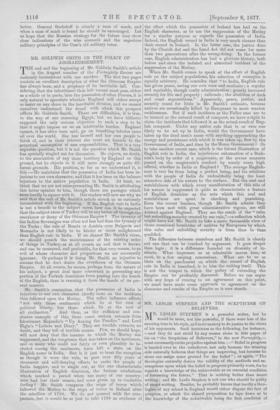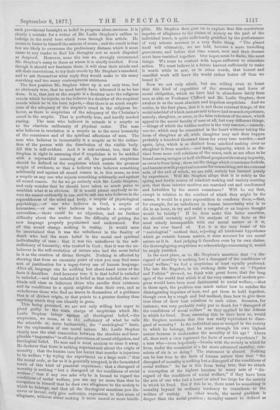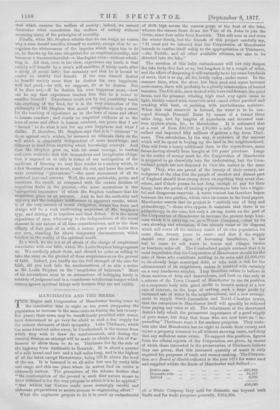MR. LESLIE STEPHEN AND THE SCEPTICISM OF BELIEVERS.
IVIR. LESLIE STEPHEN is a powerful writer, but he would be more, not less powerful, if there were less of the sneering tone in his style, and more anxietyto do justice to the views of his opponents. Such sentences as the following, for instance, —end they do not stand by any means alone in this paper of his on "the Scepticism of Believers," in the new For must necessarily excite prejudice against him :—" Belief in progress is handed over to the unbeliever, not only because the winning side naturally believes that things are improving, but because he alone can assign some ground for the belief" ; or again, "The theologian naturally denies the validity of the methods and as- sumptions upon whiph the belief in progress primarily rests, for he regards a knowledge of the unknowable as an essential condition of foreseeing the future." That is nothing better than smart writing ; and Mr. Leslie Stephen is not one who should be guilty of smart writing. Besides, lie probably knows that hardly a theo- logian of any school hi England would either dispute the fact of progress, or admit the absurd proposition he lays down as to the knowledge of the unknowable being the first condition of
such provisional foresight as belief in progress alone assumes. It is clearly a mistake for a writer of Mr. Leslie Stephen's calibre to indulge in the acrid tone which runs through this article. Ile seems to foster in himself the animus of scorn ; and the result is that few are likely to overcome the preliminary distaste which it must cause to any reader to find his thoughts not so much disputed as despised. However, none the less we strongly recommend Mr. Stephen's essay to those at whom it is chiefly levelled. Even though it should not fascinate them, it will clear their minds and sift their convictions, to try their creeds by Mr. Stephen's standard, and to ask themselves what reply they would make to his many searching and too many contemptuous strictures.
The first position Mr. Stephen takes up is not only true, but so obviously true, that he need hardly have laboured it as he has done. It is, that just as the sceptic is a doubter as to the religious creeds which he rejects, so the believer is a doubter of the sceptical creeds which he in his turn rejects,—that there is as much scepti- cism of the adequacy of the sceptic's creed in the religious be- liever, as there is scepticism of the adequacy of the Christian's creed in the sceptic. That is perfectly true, and hardly needed stating. The man who believes in miracle is a sceptic as to the absolute uniformity of physical order. The man
who believes in revelation is a sceptic as to the mere humanity of the conscience and of the spiritual affections of man. The man who believes in immortality is a sceptic as to the extinc- tion of the person with the dissolution of the visible body. All this is self-evident. And it is self-evident, too, that Mr. Stephen is right in assuming that if scepticism is to be saddled with a reproachful meaning at all, the greatest scepticism should be defined as the scepticism which resists the greatest weight of evidence, so that a believer who believes something arbitrarily and against all sound reason is, in this sense, as true a sceptic as any one who rejects something arbitrarily and against all sound reason. So far we go entirely with Mr. Leslie Stephen, and only wonder that he should have taken so much pains to establish what is so obvious, If it would please anybody to in- vert the names ordinarily in use, and to call one who believes in the separableness of the mind and body, a sceptic of physiological psychology,—or one who believes in God, a sceptic of humanism,—or one who believes in miracle a sceptic of naturalism,—there could be no objection, and no further difficulty about the matter than the difficulty of getting the new language properly popularised and understood. But all this would change nothing in reality. It would soon be ascertained that it was the unbeliever in the finality of death who had the most belief in the moral and spiritual individuality of man ; that it was the unbeliever in the self- sufficiency of humanity, who trusted in God ; that it was the un- believer in the self-evolution of nature who had the most belief in it as the creation of divine thought. Nothing is affected by showing that from an eccentric point of view you may find some sort of justification for a topsy-turvy use of human language. After all, language can be nothing but short-hand notes of the facts it describes. And however true it is that belief is unbelief in unbelief,—and that unbelief is belief in that unbelief, the mul- titude will class as believers those who ascribe their existence and its conditions to a spirit mightier than their own, and as unbelievers those who find no traces in themselves of a guidance that is of diviner origin, or that points to a greater destiny than anything which they can identify in germ. This being premised, we are not only willing but eager to plead guilty to the main ehaige of scepticism which Mr. Leslie Stephen brings against all theological belief,—the scepticism, we mean, as to the sufficiency of what he calls the scientific or, more barbarously, the " sociological " basis, for the explanation of our moral nature. Mr. Leslie Stephen clearly sees the vital connection between the absolute and inex- plicable "imperative" in all the phenomena of moral obligation, and theological belief, He sees and is most anxious to clear it away. He declares that there is nothing supernatural about the origin of morality ; that the human /ace has learnt that murder is injurious to its welfare 44 by trying the experiment on a large scale ;" that the moral code, so far as it is generally accepted, lathe formulated result of this kind of practical experience ; that a disregard of morality is nothing "but a disregard of the conditions of social welfare ;" that if any one asks why he is bound to regard the conditions of social welfare, you can say no more than that he r ehciognisee in himself that he does owe allegiance to the society to which he belongs, and that all the theological sanctions you dis- cover or invent, only give articulate expression to that sense of allegiance, without either making it more sacred or more intelli-
gible. Mr. Stephen then goes on to explain that this mysterious impulse of allegiance to the claims of society on the part of the individual heart, is quite sufficiently gratified by the performance of very minute services to a very finite thing. "The planet itself will. ultimately, we are told, become a mere travelling gravestone, and before that time comes, men and their dreams must have vanished together. Our hopes must be finite, like most things. We must be content with hopes sufficient to stimulate action. We must believe in a future harvest sufficiently to make it worth while to sow, or in other words, that honest and unselfish work will leave the world rather better off than we found it."
Now we not only admit, but are willing even to boast that this kind of exposition of the meaning and force of moral obligation, which we have had in abundance lately from men as able as Professor Clifford and Mr. Leslie Stephen, does awaken in us the most absolute and hopeless scepticism. And we notice, in the first place, that it is not those external things, of the social mischief of which men are said to have had so much experience, namely, slaughter, or error, or the false relations of the sexes, which appeal to the moral faculty of man at all, but very different things, —things of which the hidden Illative is the very essence,—namely, murder, which may be committed in the heart without taking the form of slaughter at all, while slaughter may and does happen probably a hundred thousand times for every true murder,—and again, lying, which is as distinct from mischief-making error as slaughter is from murder,—and lastly, impurity, which is as dis- tinct from mere evil relations of the sexes, such as are often to be found among savages or half-civilised peoples without any impurity, as error is from lying ; these arethe things which conscience forbids, and haunts uswith perpetual remorse for committing,not the external acts, of the evil of which, we are told, society has learned purely by experience. Will Mr. Stephen allege that it is solely as the spring and fertile source of mischief-making and society-marring acts, that these interior motives are searched out and condemned and forbidden by the secret conscience? Will he say that, except in relation to the conduct of which they might be the causes, it would be a pure superstition to condemn them,—that, for example, for an unbeliever in human immortality who is to die in an hour, to try and resist a vengeful or an impure thought would be fatuity ? If he does make this latter assertion, we should certainly reject his analysis of the facts as the most utterly incompatible with our moral nature as it is,
that we ever heard of. Yet it is the very boast of his " sociological " method that, rejecting all irrelevant hypotheses which go outside human nature, it does account for our moral nature as it is. And judging it therefore even by its own claims, the thoroughgoing scepticism we acknowledge concerning it, would be amply justified. In the next place, as to Mr. Stephen's assertion that "a dis- regard of morality is nothing but a disregard of the conditions of social welfare," we feel a scepticism at least equally profound. The late Mr. Bagehot, in his striking little book on " Physies and Politics" showed, we think with great force, that for long ages of the world that which is of the very essence of modern pro- gress would have been most detrimental to social welfare,—that in those ages, the problem was much rather how to subdue the disintegrating impulses of men, and get them to hold together, though even by a rough and bad method, than how to give them true ideas of their best relations to each other. Socrates, for instance, was very probably really put to death for "disregard of the conditions of social welfare" as they applied to the Athens in which he lived. Now, assuming this to have been so, would Mr. Stephen maintain that this was really equivalent to disre- gard of morality ? Is the individual man so merged in the society to which he belongs, that he must strangle his own highest nature because it undermines the morality of his age ? Above all, does such a view represent the facts of moral experience? Is a man who—even hopelessly—breaks with the society in which he lives, under the constraint of a far more advanced morality, con- scious of sin in so doing ? The statement is absurd. Nothing can be less true to the facts of human nature than that "the disregard of morality is nothing but a disregard of the conditions of social welfare." So far is this from being true, that we attach a conception of the highest heroism to many acts of "dis- regard of the conditions of social welfare," if they have been the acts of one who had a heart or mind too large for the society in which he lived. But if this be so, there must be something in morality beyond its ordinary tendency to contribute to the welfare of society. In other words, the moral problem is deeper than the social problem ; morality cannot be defined as
that whick ensures the welfare of society ; indeed, we cannot determine what constitutes the welfare of society without ass uutirig many of the principles of morality.
Finally, when Mr. Stephen admits that he can assign no reason why a man should sacrifice himself to society, except that he re- cognises the virtuousness of the impulse which urges him to do so, he throws up his case altogether for an empirical morality, and becomes a transcendentalist—a theologian even—without admit- ting it. All that, even in his view, experience can teach, is that society will benefit by a man's self-sacrifice, if wisely made after a study of social laws ; but certainly not that he is bound to confer on society that benefit. If the man himself desires to benefit society more than he desires his own happiness, well and good,—he will, we suppose, do as he desires. But if he does not,—if he desires his own happiness most,—how can he say that experience teachea him that he is bound to sacrifice himself? Experience could not by any possibility teach him anything of the kind, for it is the very contention of the philosophy of Mr. Stephen that moral obligation is only a name for the teaching of experience as to the laws of cause and effect in human conduct ; and clearly no empirical evidence as to the laws of cause and effect in human conduct, can prove that I am " bound " to do what is not for my own happiness and what I dislike. If, therefore, Mr. Stephen says that it is " virtuous" to de so against one's wishes, he assumes an ultimate claim on the will which is absolutely independent of mere knowledge, and different in kind from anything which knowledge conveys. And then Mr. Stephen goes on, with his usual courage, to confess and even maintain that this tremendous and inexplicable obliga- tion is imposed on us only in virtue of our anticipation of the modicum of blessing we may thus render to a society which, in a few thousand years at most, must die out, and leave the earth a mere revolving "gravestone,"—the mere monument of all its perished joys and sorrows. Well, the more perishable, petty, and uncertain the reeuit, as compared with the certain dictates of imperious desire in the present,—the more mysterious is this categorical imperative ' of which Mr. Stephen confesses that his scepticism gives us no account. And in fact the authority and urgency and the complete indifference to apparent results, which is of the very essence of moral obligation, always has been and always will be a rock confronting scepticism of Mr. Stephen's type, and driving it to hopeless and final defeat. It is the moral experience of man, witnessing to the independence of the moral element in our nature of all time-considerations, and to the close affinity of that part of Us with a nature purer and holier than our own, standing far above temporary circumstances, which teaches us the reality of the spiritual world.
lp a word, we are not at all afraid of the charge of scepticisms correlative with our faith, which Mr. Leslie Stephen brings against us. We cordially admit them, and should be quite as willing to take tho issue on the ground of those scepticisms as on the ground of faith. Indeed, you hardly see the full strength of the case for faith, till you look into the recriminations of so able a writer as Mr. Leslie Stephen on the "scepticism of believers." Most of his accusations seem to us accusationa of indulging freely in sobriety of judgment and in a considerate intellectual temper which cannot ignore spiritual things only because they are not visible.
































 Previous page
Previous page